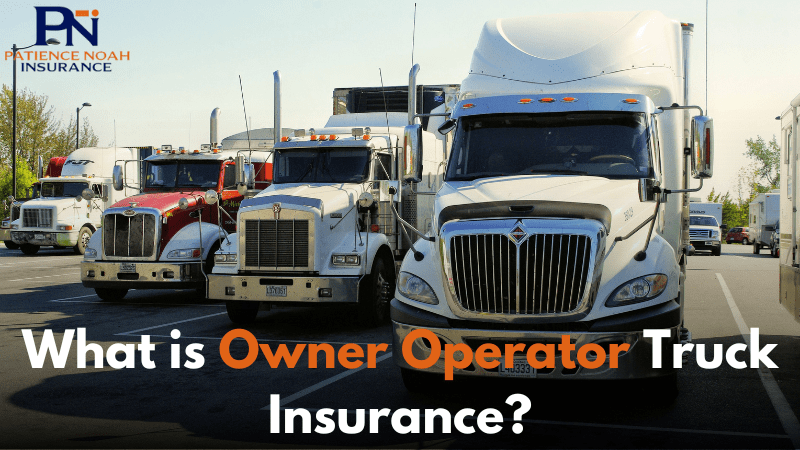It is fascinating to be the “owner” of something specific, and if it is a business, it multiplies the excitement and satisfaction. With the freedom that comes with being one’s boss comes the great responsibility of managing and handling everything independently. Let’s apply this fact to a real-life situation. Suppose you independently handle a business involving trucks.
Whether you operate them by yourself or have people do so, it involves many risks involving your property and the perimeters in which it is being used. What now? How would you protect your business as an owner and yourself as an operator? Here’s what you will do. You will insure your property with a relevant insurance policy. Let’s dive into the details.
Owner Operator Trucking Insurance
In simple terms, this insurance is for individuals who independently operate trucks or have a trucking business. It is also known as owner operator truck insurance. This insurance covers all potential risks arising while your trucks are out there, for work, or on lease.
According to statistics on truck accidents in the USA, there are almost 168k accidents annually, with more than 178k people getting injured. Trucks are very prone to accidents and damage, which is exactly why a comprehensive insurance policy is necessary to protect your trucking business against these unforeseeable circumstances.
Who Needs Truck Insurance for Owner-Operators?
The owner operator truck insurance protects trucks from unpredictable damage or loss in personal and commercial arenas. It is also needed by people working on permanent leases for motor carriers or long-haul truck drivers.
Which Trucks Are Covered Under This Insurance?
This insurance covers a range of trucks, including heavy trucks, carrier trucks, loaders, dumping trucks, tow trucks, and semi trucks (medium and high profile).
Requirements for Truck Insurance
The most essential requirements for getting this insurance include registering your truck and having a commercial driver’s license. Next, the weight limit and maintaining the hours of service are essential. Requirements may differ from company to company and truck to truck.
Trucking Insurance Coverage Types
Trucking insurance has different coverage types. Each policy varies regarding the magnitude and characteristics of coverage and its costs. The general types of this insurance are the following:
General Liability Coverage own
This policy covers the loss or damage to a third party, e.g., if someone gets injured by or falls over your property. When the operator causes an accident or damage, this policy covers property damage, medical expenses, or legal expenses for others.
Commercial Legal Coverage
This policy helps with the legal defense and lawsuits for the truck’s operator in case of accidents, property theft, or vandalism.
Physical Damage Coverage
This policy covers the cost of truck damage, including dents, cracks, or other structural damage. Damage could be caused by a collision, an accident, or other unforeseeable circumstances.
Cargo Coverage
This policy covers the damage or loss of cargo in transit or haul. The goods being transported are thus recovered or compensated for with this coverage.
Compensation for Worker Coverage
This coverage best suits people who have a trucking business and hire other people to drive trucks other than themselves. This policy will cover work-related damage, accidents, deaths, or lawsuits for the workers of the insured company.
Non-Trucking Liability Coverage
This policy is like general liability coverage, except for damage or loss when the truck is used for personal purposes instead of commercial ones.
In addition, many companies offer a range of coverage types, including gap coverage, boot bail coverage, equipment coverage, and umbrella coverage.
Cost of Own Operator Trucking Insurance
The cost of own-operator trucking insurance can vary if the operator is driving the trucks or is under lease to another motor carrier. Generally, the premium of any best truck insurance for owner operators ranges from $350-$1000 per month. And it is estimated to be up to $15,000 annually. However, certain factors can reduce or increase the premium. These factors include:
Truck Type
The type and size (light, medium, or high duty) of the truck impact the cost of coverage. Other factors could be the truck’s model and age.
Number of Trucks
How many trucks are to be insured, and under which type of coverage affects the cost of coverage?
Driving History
The drivers’ driving records are vital, as the insurance company will not risk their insurance for an inexperienced or careless driver with so many road offenses to their name. Other than this, the demographics of drivers, including their age, are considered. Generally, drivers under 25 are not covered under this coverage.
Type of Cargo in Transit
The type and nature of goods impact the premium cost. Goods of high value, delicate, or dangerous nature (e.g., explosive material) can increase the amount of coverage.
Driving Locations
Driving locations and routes can increase the cost of premiums if the routes are risky, unsafe, or vulnerable to accidents.
Experience as Owner-Operator
The owner’s field experience gives a significant advantage regarding coverage costs. The more experienced they are, the higher their chances of being less risky. Insurance companies must be more considerate regarding inexperienced or fresh operators, so they charge more.
Type of Coverage
Coverage rates are directly proportionate to the type of coverage one applies for. The higher the rates, the greater the coverage (of property and people).
Conclusion
You must protect your property and drivers from unpredictable dangers and risks by having the right and best insurance policy for your trucking business. Do your research to find the right insurance company and owner operator trucking insurance policy. Always compare quotes for the best truck insurance for owner operators and choose the one that best suits your budget and requirements.















